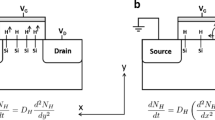Abstract
Reliability and variability issues are the biggest design challenges facing nanoscale high-speed applications. Negative bias temperature instability (NBTI) is the major reliability issues with the scaled devices. Effect of NBTI increases with the time and it increases the threshold voltage of PMOS. This paper presents an NBTI degradation sensor which monitors the change in standby leakage current (\(I_{ddq}\)) of the test circuit under the stress conditions. The performance of proposed sensor is linear and highly sensitive. Due to high sensitivity, the proposed sensor is best suited for compensation of temporal degradation during measurement. The sensitivity of the proposed sensor further increase at elevated temperature (125 \(^{\circ }\)C) compares to room temperature (27 \(^{\circ }\)C). The proposed sensor has the improvement in sensitivity of 20.12% and 74.82% as compared to CM based sensor at room temperature and elevated temperature respectively. The transimpedance of the proposed sensor is linear and the linearity is unaffected by the voltage and temperature variations. The proposed sensor is 25% smaller and has faster response compared to CM based sensor. The proposed sensor is also unaffected by the supply voltage variations.
Access this chapter
Tax calculation will be finalised at checkout
Purchases are for personal use only
Similar content being viewed by others
References
Borkar, S., et al.: Microarchitecture and design challenges for gigascale integration. MICRO 37, 3 (2004)
Cho, M., Lee, J.D., Aoulaiche, M., Kaczer, B., Roussel, P., Kauerauf, T., Degraeve, R., Franco, J., Ragnarsson, L.Å., Groeseneken, G.: Insight into N/PBTI mechanisms in sub-1-nm-EOT devices. IEEE Trans. Electron Devices 59(8), 2042–2048 (2012)
Panagopoulos, G.D., Roy, K.: A three-dimensional physical model for \(V_{th}\) variations considering the combined effect of NBTI and RDF. IEEE Trans. Electron Devices 58(8), 2337–2346 (2011)
Wang, Y., Enachescu, M., Cotofana, S.D., Fang, L.: Variation tolerant on-chip degradation sensors for dynamic reliability management systems. Microelectron. Reliab. 52(9), 1787–1791 (2012)
Schroder, D.K.: Negative bias temperature instability: what do we understand? Microelectron. Reliab. 47(6), 841–852 (2007)
Singh, P., Karl, E., Blaauw, D., Sylvester, D.: Compact degradation sensors for monitoring NBTI and oxide degradation. IEEE Trans. Very Large Scale Integr. VLSI Syst. 20(9), 1645–1655 (2012)
Habchi, R., Salame, C., Khoury, A., Mialhe, P.: Temperature dependence of a silicon power device switching parameters. Appl. Phys. Lett. 88(15), 153503 (2006)
Khan, S., Hamdioui, S.: Temperature impact on NBTI modeling in the framework of technology scaling. In: Proceeding 2nd HiPEAC Workshop on Design for Reliability, Pisa, Italy (2010)
Khan, S., Hamdioui, S.: Temperature dependence of NBTI induced delay. In: 16th IEEE International On-Line Testing Symposium (IOLTS), pp. 15–20 (2010)
Kim, K.K., Wang, W., Choi, K.: On-chip aging sensor circuits for reliable nanometer MOSFET digital circuits. IEEE Trans. Circuits Syst. II Express Briefs 57(10), 798–802 (2010)
Yadav, N., Jain, S., Pattanaik, M., Sharma, G.: NBTI aware IG-FinFET based SRAM design using adaptable trip-point sensing technique. In: IEEE/ACM International Symposium on Nanoscale Architectures (NANOARCH), pp. 122–128 (2014)
Mostafa, H., Anis, M., Elmasry, M.: Adaptive body bias for reducing the impacts of NBTI and process variations on 6T SRAM cells. IEEE Trans. Circuits Syst. I Regul. Pap. 58(12), 2859–2871 (2011)
Mostafa, H., Anis, M., Elmasry, M.: NBTI and process variations compensation circuits using adaptive body bias. IEEE Trans. Semicond. Manuf. 25(3), 460–467 (2012)
Chen, S.L., Ker, M.D.: A new schmitt trigger circuit in a 0.13-/spl mu/m 1/2.5-V CMOS process to receive 3.3-V input signals. IEEE Trans. Circuits Syst. II Express Briefs 52(7), 361–365 (2005)
Kang, K., Alam, M.A., Roy, K.: Characterization of NBTI induced temporal performance degradation in nano-scale SRAM array using \(I_{ddq}\). In: IEEE International Test Conference, ITC 2007, pp. 1–10 (2007)
Wang, Y., Cotofana, S.D., Fang, L.: Statistical reliability analysis of NBTI impact on FinFET SRAMs and mitigation technique using independent-gate devices. In: IEEE/ACM International Symposium on Nanoscale Architectures (NANOARCH), pp. 109–115 (2012)
Wang, Y., Cotofana, S.D., Fang, L.: Analysis of the impact of spatial and temporal variations on the stability of SRAM arrays and the mitigation technique using independent-gate devices. J. Parallel Distrib. Comput. 74(6), 2521–2529 (2014)
Traversi, G., Gaioni, L., Ratti, L., Manghisoni, M., Re, V.: Perspectives of 65 nm CMOS technologies for high performance front-end electronics. In: 21st International Workshop on Vertex Detectors, 026 (2012)
Kim, N.S., Austin, T., Baauw, D., Mudge, T., Flautner, K., Hu, J.S., Irwin, M.J., Kandemir, M., Narayanan, V.: Leakage current: Moore’s law meets static power. computer 36(12), 68–75 (2003)
Acknowledgement
The authors would like to thank the University Grant Commission (UGC) New Delhi, Government of India for providing financial support and CSIR, Government of India with research project grant no. 22/0651/14/ EMR-II, for simulation software.
Author information
Authors and Affiliations
Corresponding author
Editor information
Editors and Affiliations
Rights and permissions
Copyright information
© 2017 Springer Nature Singapore Pte Ltd.
About this paper
Cite this paper
Shah, A.P., Yadav, N., Vishvakarma, S.K. (2017). LISOCHIN: An NBTI Degradation Monitoring Sensor for Reliable CMOS Circuits. In: Kaushik, B., Dasgupta, S., Singh, V. (eds) VLSI Design and Test. VDAT 2017. Communications in Computer and Information Science, vol 711. Springer, Singapore. https://doi.org/10.1007/978-981-10-7470-7_44
Download citation
DOI: https://doi.org/10.1007/978-981-10-7470-7_44
Published:
Publisher Name: Springer, Singapore
Print ISBN: 978-981-10-7469-1
Online ISBN: 978-981-10-7470-7
eBook Packages: Computer ScienceComputer Science (R0)




